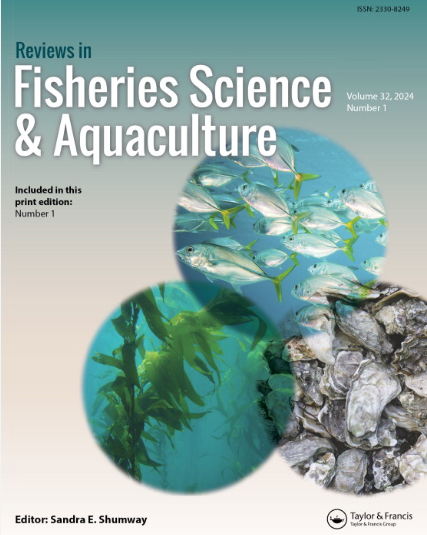Atlantic Sturgeon Status and Movement Ecology in an Extremely Small Spawning Habitat: The Nanticoke River-Marshyhope Creek, Chesapeake Bay
IF 6.4
1区 农林科学
Q1 FISHERIES
引用次数: 0
Abstract
Abstract Biotelemetry of Atlantic sturgeon Acipenser oxyrinchus oxyrinchus has exposed spawning behaviors in ever-smaller estuaries, surprising for the NW Atlantic’s largest anadromous species. Small estuary — the Nanticoke River and Marshyhope Creek (Chesapeake Bay) — spawning-run adults and their habitat affinities are described based upon direct sampling and biotelemetry for the period 2014–2018. High rates of recapture over this period indicate a very small adult population size. Genetics revealed a very small effective population size (N e = 12.2, 95% CI = 6.7–21.9). Most returns occurred during September at 20–27 °C. All fish departed as fall temperatures declined below 20 °C. Multi-beam sonar identified small-dispersed areas of sand-cobble and cobble, which could support adhesive embryo attachment. Movements of adults were higher during nighttime than daytime, with habitat preference for hard bottom habitats. Genetic evidence indicates that the sudden discovery of this population was unrelated to a hatchery release of several thousand juvenile sturgeon (Hudson River progeny) in 1997. The newly discovered population in the Nanticoke River exhibits a degree of resilience including multiple spawning regions and suitable spawning habitat. Still, critical vulnerabilities persist including curtailed habitat, continued agricultural and maritime development, invasive blue catfish, and a very small apparent population size. Supplemental data for this article is available online at https://doi.org/10.1080/23308249.2021.1924617一个极小产卵栖息地的大西洋鲟鱼状况和运动生态学:切萨皮克湾南蒂科河马希霍普溪
摘要大西洋鲟鱼的生物遥测显示,尖吻鲟在越来越小的河口产卵,这对西北大西洋最大的溯河产卵物种来说是令人惊讶的。根据2014-2018年期间的直接采样和生物遥测,描述了小河口——楠蒂科河和马希霍普溪(切萨皮克湾)——产卵的成虫及其栖息地亲缘关系。这一时期的高捕获率表明成年人口规模非常小。遗传学显示,有效种群规模非常小(N e=12.2,95%CI=6.7–21.9)。大多数回归发生在9月20–27日 °C。由于秋季气温降至20度以下,所有鱼类都离开了 °C。多波束声纳识别出小面积分散的砂卵石和卵石,可以支持粘性胚胎附着。成虫在夜间的活动高于白天,栖息地更喜欢硬底栖息地。遗传证据表明,这一种群的突然发现与1997年孵化场释放的数千条幼年鲟鱼(哈德逊河后代)无关。Nanticoke河新发现的种群表现出一定程度的恢复力,包括多个产卵区和合适的产卵栖息地。尽管如此,关键的脆弱性仍然存在,包括栖息地减少、农业和海洋持续发展、入侵蓝鲶鱼以及明显的种群规模非常小。本文的补充数据可在线获取,网址为https://doi.org/10.1080/23308249.2021.1924617
本文章由计算机程序翻译,如有差异,请以英文原文为准。
求助全文
约1分钟内获得全文
求助全文
来源期刊

Reviews in Fisheries Science & Aquaculture
FISHERIES-
CiteScore
25.20
自引率
0.90%
发文量
19
期刊介绍:
Reviews in Fisheries Science & Aquaculture provides an important forum for the publication of up-to-date reviews covering a broad range of subject areas including management, aquaculture, taxonomy, behavior, stock identification, genetics, nutrition, and physiology. Issues concerning finfish and aquatic invertebrates prized for their economic or recreational importance, their value as indicators of environmental health, or their natural beauty are addressed. An important resource that keeps you apprised of the latest changes in the field, each issue of Reviews in Fisheries Science & Aquaculture presents useful information to fisheries and aquaculture scientists in academia, state and federal natural resources agencies, and the private sector.
 求助内容:
求助内容: 应助结果提醒方式:
应助结果提醒方式:


